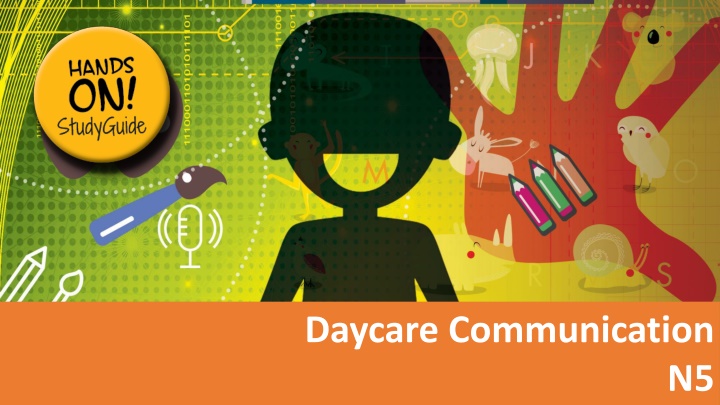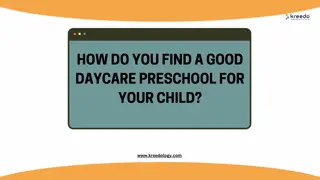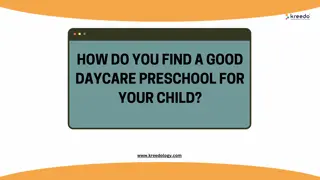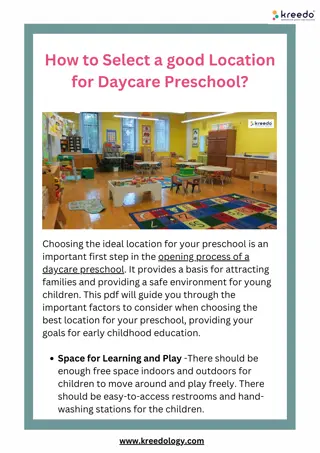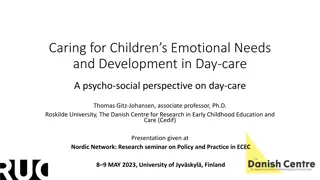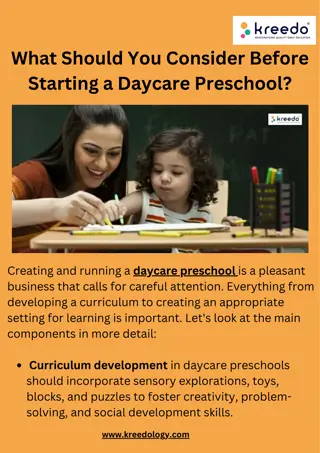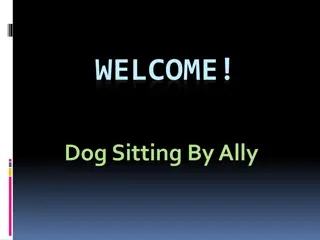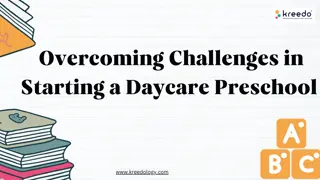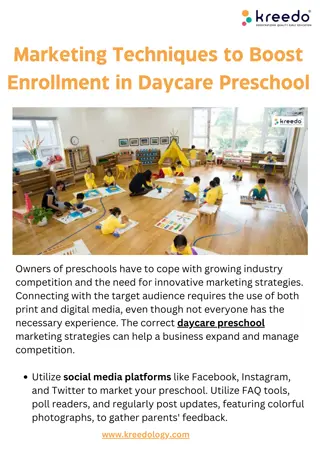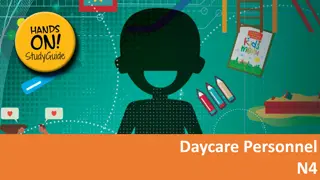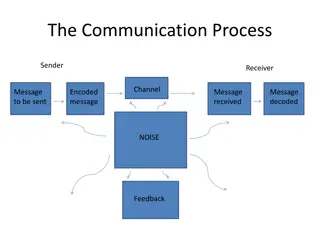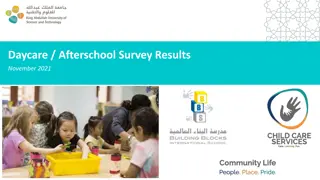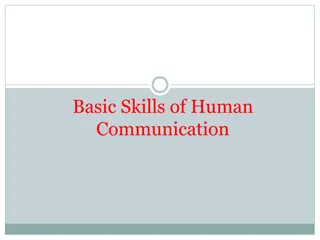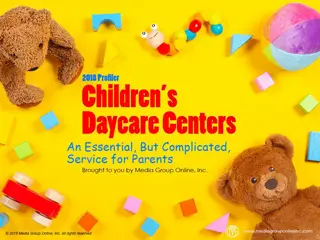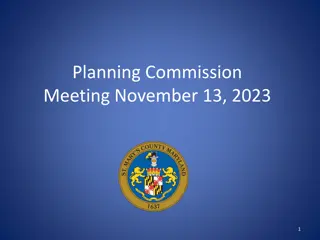Enhancing Communication Skills in Daycare Settings
Effective communication plays a crucial role in the success of daycare centers by preventing misunderstandings, improving cooperation, and fostering a team approach to child care. This content delves into the communication model, verbal and non-verbal communication, and the impact of communication on human relations and perceptual barriers in daycare settings.
Download Presentation

Please find below an Image/Link to download the presentation.
The content on the website is provided AS IS for your information and personal use only. It may not be sold, licensed, or shared on other websites without obtaining consent from the author.If you encounter any issues during the download, it is possible that the publisher has removed the file from their server.
You are allowed to download the files provided on this website for personal or commercial use, subject to the condition that they are used lawfully. All files are the property of their respective owners.
The content on the website is provided AS IS for your information and personal use only. It may not be sold, licensed, or shared on other websites without obtaining consent from the author.
E N D
Presentation Transcript
Module 1 Concepts of communication THE COMMUNICATION MODEL Communication is the exchange of information (a message) between two or more people. The elements of communication are the: Sender and receiver; Message and code; Medium; Feedback; and Barriers. www.futuremanagers.com
Module 1 Concepts of communication (continued) COMMUNICATION IN THE DAYCARE CENTRE Effective communication is vital to a daycare centre s success. Good communication can prevent misperceptions and mismatched expectations, encourage improved cooperation and foster a team approach to caring for the children. Daycare teachers should use a mixture of written, verbal and electronic communication to ensure the smooth running of the centre. www.futuremanagers.com
Module 1 Concepts of communication (continued) VERBAL COMMUNICATION Verbal communication refers to the spoken and written word. This form includes sounds, words, language and speech and can be classified into four types as follows: Intrapersonal; Interpersonal; Extra-personal; and Mass communication. www.futuremanagers.com
Module 1 Concepts of communication (continued) NON-VERBAL COMMUNICATION Non-verbal communication includes the overall body language of the person who is speaking. Non-verbal communication manages to convey the sender s message without having to use words. It is the key to a great presentation. www.futuremanagers.com
Module 1 Concepts of communication (continued) HOW COMMUNICATION AFFECTS HUMAN RELATIONS AND PERCEPTUAL CARRIERS IN THE DAYCARE CENTRE It is important for an educare professional to always to maintain an open and honest communication channel to establish and maintain comfortable relationships. Communication can provide a channel to avoid and reduce conflict, and to give clear direction when necessary. www.futuremanagers.com
Module 2 Language skills BASIC GRAMMAR Grammar is important because it allows us to communicate in the best possible way. The skill of proper grammar is to be able to talk about how sentences are structured, and about the types of words and word groups that make up sentences. We study grammar because language is the most widely used of all human activities and grammar gives meaning to language. www.futuremanagers.com
Module 2 Language skills (continued) SPELLING AND PUNCTUATION Learning to spell helps to cement the connection between the letters and their sounds, and learning to master sight words improves reading, writing, comprehension and vocabulary. Punctuation makes it easier to read and consists of both rules and conventions. Without punctuation our writing would not make sense. www.futuremanagers.com
Module 2 Language skills (continued) VOCABULARY One of the best ways to improve and develop one s vocabulary is by reading. One should also try to find out the meaning of words that one does not understand. One should also try and use these words in conversation and texts. A dictionary or thesaurus may help find meanings to words found in texts. www.futuremanagers.com
Module 2 Language skills (continued) PROOFREADING Proofreading refers to improving your written work by inspecting your text carefully to find and correct errors and mistakes in grammar, style and spelling. Proofreading mainly involves looking for errors or omissions rather than improving writing style or tone. www.futuremanagers.com
Module 3 Correspondence and written work WRITING OBSERVATION An observation report is a great way for any person to hone their skills. This report requires one to observe and it also allows the opportunity to practise writing and editing. www.futuremanagers.com
Module 3 Correspondence and written work (continued) REPORTS A report is a well-structured, informative, objective document written to present information on a particular subject or issue to interested groups or individuals. There are numerous types of reports, such as: Annual reports; Observation reports; and Factual reports. www.futuremanagers.com
Module 3 Correspondence and written work (continued) FORMAL LETTERS Formal letters have an important place as a means of correspondence in our business world today because they are regarded as protocol. Whether they are posted, faxed or emailed as an attachment they carry more weight than a simple email or faxed message. www.futuremanagers.com
Module 3 Correspondence and written work (continued) BUSINESS LETTERS It is very important that all business letters make a good, lasting impression. A company or organisation such as your daycare centre will probably select a format that best matches its letterhead. A letterhead consists of the organisation s name, address, telephone and fax number as well as an email address. www.futuremanagers.com
Module 3 Correspondence and written work (continued) JOB RELATED CORRESPONDENCE There are tips to assist you during the job-related correspondence process: Focus on your qualifications and experience and why you fit the job profile. Use simple and clear English. Keep the communication short, concise, clear, and focused. Correspondence must be written in a formal manner. Send your thank-you letters after your interview. www.futuremanagers.com
Module 3 Correspondence and written work (continued) QUESTIONNAIRES Questionnaires are usually sent out for a specific reason and often the main aim is to gather information about a certain product or service. Questionnaires can be used for: Marketing; Public relations; and Investigation. www.futuremanagers.com
Module 3 Correspondence and written work (continued) ADVERTISEMENTS Commercialism in schools comes in many different forms; such as simple advertising to attract the attention of young children, their parents or the community at large. Advertising is mainly used to: Inform; Remind; and Persuade. www.futuremanagers.com
Module 3 Correspondence and written work (continued) ARTICLES Ask yourself the following questions when writing an article: What is the purpose and who is the audience? Is my writing clear and effective? How do the conventions of language influence my written communication? How will I present my findings? Can my readers find what information they are looking for? www.futuremanagers.com
Module 4 Textual studies FICTION AND POETRY Fiction is commonly divided into three areas based on the general appearance of the text: Stories and novels; Poetry: Lines of varying length, forming stanzas; Plays: Spoken lines and stage directions, arranged in scenes and acts. www.futuremanagers.com
Module 4 Textual studies (continued) NON-FICTION Non-fiction refers to factual and true texts, such as in a newspaper, magazine or pamphlet. One reads non-fiction work to gather specific information. www.futuremanagers.com
Module 4 Textual studies (continued) FILMS AND VIDEOS A film review is a popular way for critics to assess a film s overall quality and determine whether or not they think the film is worth recommending. A good film or movie review should entertain, persuade and inform, providing an original opinion without giving away too much of the plot. www.futuremanagers.com
Module 5 Creative writing CREATIVE WRITING Story-telling is also an important part of teaching because learning is both more efficient and more memorable when the lesson is conveyed through a story. Writing or telling a children s story requires: Vivid imagination; Good speech; Enthusiastic creativity; and The ability to put yourself in the mind of a child. www.futuremanagers.com
Module 6 Study skills and question-and- answer techniques QUESTION-AND-ANSWER TECHNIQUES Questioning and answering is one of the most important dimensions of teaching and learning and is based around recall. There are many types of questions, such as: Closed and open types; and Lower order (what questions) and higher order (why and how questions) types. www.futuremanagers.com
Module 6 Study skills and question-and-answer techniques (continued) STUDY SKILLS When you study you are reading - you need to make sure you re actively involved with the text. Note-taking is a skill that you will need in order to be a successful student. Notes should help you to: Fix information in your mind. Revise. www.futuremanagers.com
Module 6 Study skills and question-and-answer techniques (continued) MIND MAPPING Mind mapping is a technique that uses diagrams to represent ideas. Mind maps imitate the way we think, which is why they are one of the most effective aids to learning and memory. www.futuremanagers.com
Module 6 Study skills and question-and-answer techniques (continued) MEMORISATION TECHNIQUES Memory works by making links between information, fitting facts into mental structures and frameworks. Memory techniques are at the heart of memory study and memory improvement. Examples of memorisation techniques are: Forming rhymes; and Forming mnemonics from key words. www.futuremanagers.com
Module 6 Study skills and question-and-answer techniques (continued) ASSOCIATION Association is the method by which you link a thing to be remembered to a method of remembering it. Memorisation, or rote learning, is a very difficult way for our brains to store information. Instead, we want to make as many connections between ideas as possible, and therefore maximise our chances of recalling it. www.futuremanagers.com
